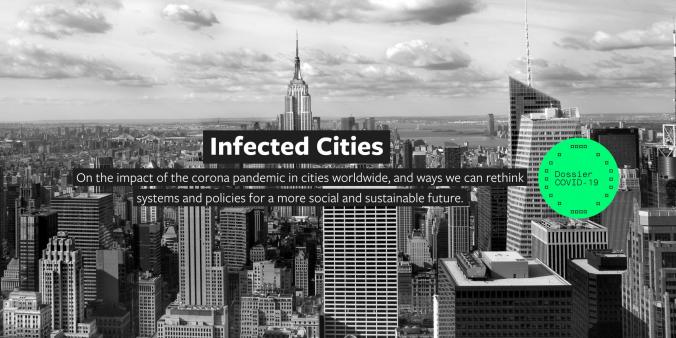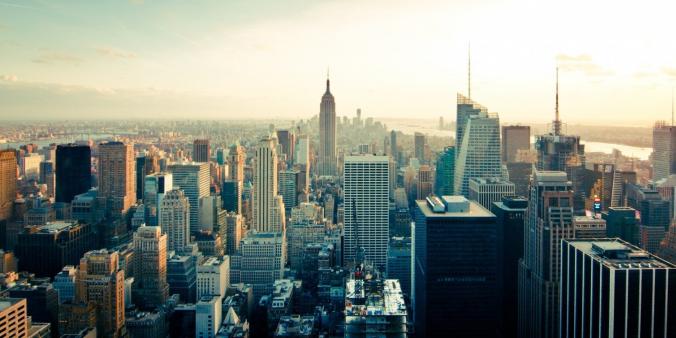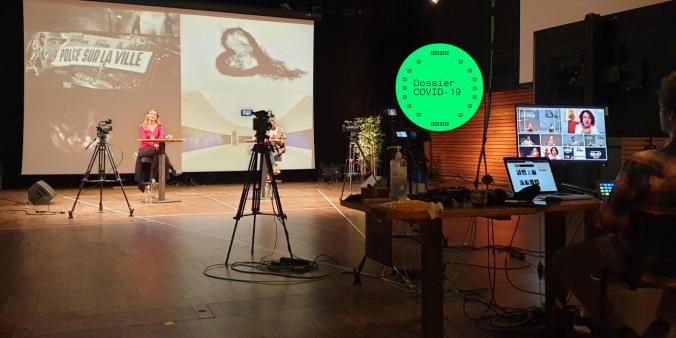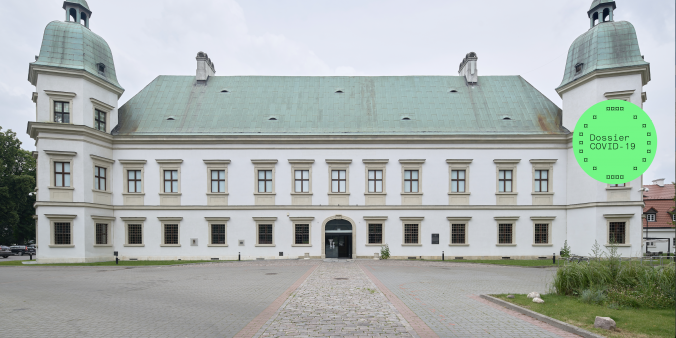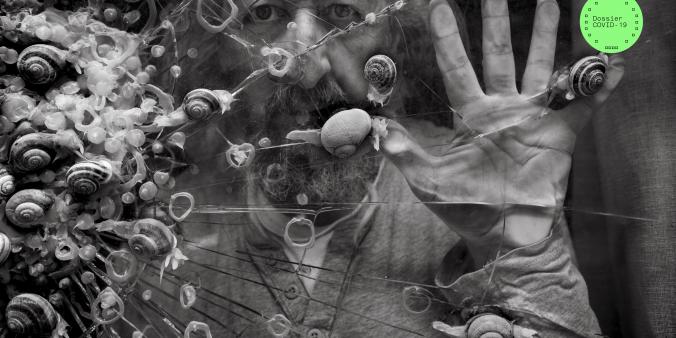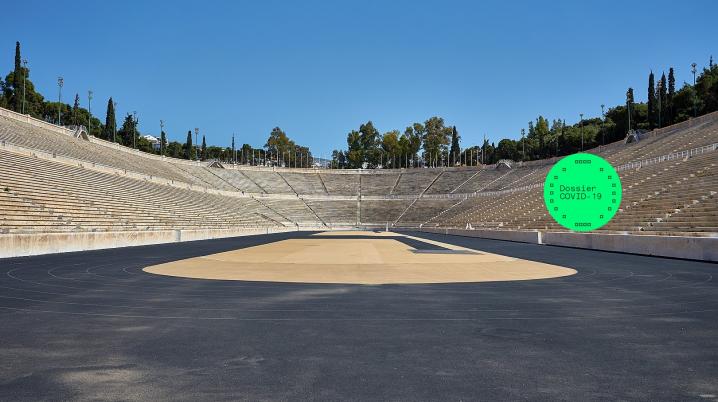
Creating hope, connection and solidarity – Recap of Infected Cities #12: Athens
On December 17th, artists, journalists and professionals from different backgrounds connected through Zoom for a conversation from Pakhuis de Zwijger led by moderator Jennifer Muntslag, joined by photographer, musician and researcher Thomas Huisman. From Athens, the participants reflected on their city, which has suffered through a decade of economic crises, refugee crises and political instability, and is now dealing with the consequences of the pandemic. (video below)
Greece, like many other European countries, has started the new year in lockdown. In addition to the global pandemic, the country has struggled these past ten years with an ongoing economic and refugee crisis and with political instability. The capital Athens is one of the world’s oldest cities and its (classical) tradition of arts and culture serves as an inspiration for artists around the world. Currently, however, the already struggling cultural sector is receiving little support from the government. Philanthropic foundations are alleviating some of the worst pain, but the situation remains dire. Greece is also lagging behind in digital developments, which does not make the artists’ practice in times of corona any easier. So, how are Athenians dealing with these issues? What are their hardships and inspirations, and how can they create hope, connection, empowerment and solidarity? These are some of the topics discussed during Infected Cities #12.
Polarisation
Lefteris Papagiannakis, head of advocacy at Solidarity Now, offered some perspective on the situation in general, painting a grim picture of what the future may hold: “Greece experienced a ten-year financial crisis, and just when it seemed like things were beginning to go up, the pandemic hit. And it hit very hard. Polarisation is just one of the big issues we are facing. The space for discussion is very limited, especially when you talk about vulnerable groups like migrants and refugees. The policy of the new government is very toxic towards them. It’s even more polarised than the ideological differences between us as citizens. Migrants and refugees are at the centre of all political discussions throughout Europe. And the pandemic is only adding to this. First, migrants were targeted as a danger to citizens for supposedly spreading the infection. Now they are being labelled as a threat to national security. Of course, our economic situation is very problematic too. I don’t think we will see the full effects of the pandemic until after this summer. For the moment, we’re hanging by a thread.”
However, journalist Philippa Dimitriadi appeared more hopeful, despite the challenging circumstances she has had to deal with: “Aside from my regular work, I currently also work as an assistant coordinator for a programme called Migratory Birds. It’s a newspaper that is produced and published by a team of young journalists: teenage refugees and migrants, as well as Greeks. The project is supported by the NGO Network for Children’s Rights. During the pandemic, we’ve had to do the impossible to continue publishing our paper. Many members of our young journalists’ team were in quarantine for weeks. Even during the six months in between the two official lockdowns, many of the camps were closed. Our reporters couldn’t get in, couldn’t get out and people within the camps were given no information about the situation. Some didn’t have internet access or the necessary equipment, so we had to be incredibly creative to keep this project going. We used to have editorial meetings twice a month. Now, we use chat applications or Zoom, whenever possible. Many of our members live in shelters or camps. So, while they do have internet access, the signal isn’t always good and they almost never have any privacy. But we manage. The good thing about teenagers is it doesn’t matter where they’re from or what their background is – they have a lust for life and a sense of joy that nobody can take away from them. This gives you the motivation and strength you need to carry on and find creative ways and solutions to overcome the obstacles you are faced with.”
Hang out the laundry
Several creatives also gave a personal insight into how the pandemic has affected their work. During the second lockdown, the photography project of Theodora Malamou, an artist and curator of independent art projects, took on new meaning: “I was born and raised in central Athens, near Victoria Square – a part of the city centre that is definitely not touristic, nor part of any sightseeing. My neighbourhood has been on the news a lot over the last few years for a variety of reasons. It has been called a ghetto, linked to criminality and used as a temporary shelter by refugees. In the past, this area was home to the upper and middle classes of the city, but after years of neglect and abandonment, it has completely lost its sparkle. At the same time, many people from other countries came here and formed strong communities, opened shops and restaurants, adding their own colour to the neighbourhood’s identity. A strong element that can be seen throughout the neighbourhood is that of laundry hanging out to dry – or bougada, as we call it in Greek. I decided to create a project inspired by this, called Athens Laundry Bougada. The project started in June with daily photographs of the impromptu installations of clothes and other private belongings. These carry plenty of information – not just about their owners, but also about the whole area’s unique cultural, social and economic mixture. A second part of the project was launched in October, whereby contemporary artists who work with textile were invited to have their artworks photographed while hanging from buildings in the area, like a kind of alternative laundry.
The project was actually initiated before the pandemic, but because part of it coincided with the second lockdown in Athens, its dynamic changed. Now, it was no longer about using social media just to reach a wider audience. It also offered viewers an opportunity to take a photographic ‘walk’ during a time when they were locked inside their homes. And it was about bringing people together, about showing what this neglected urban zone looks like. And hopefully, destroying a few stereotypes. One of the examples is an image of my neighbours’ balcony, with their kids’ princess costumes hanging from the clothesline – as a reminder that, under difficult circumstances, little things can bring some much-needed magic to our lives.”
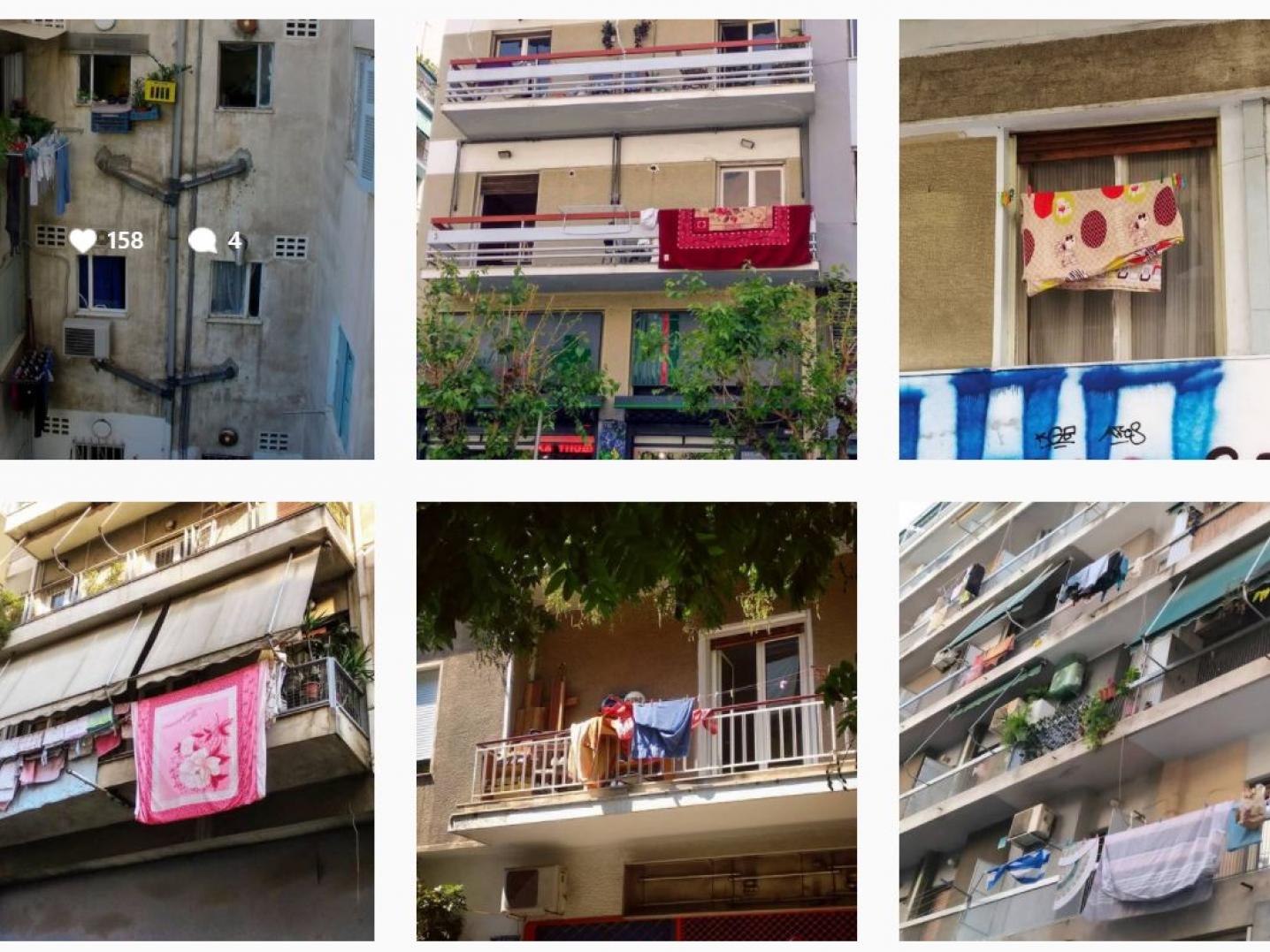
Angeliki Douveri, visual artist: “After the first lockdown, I took time to reflect on what was happening and realised I was bound to my house: I couldn’t go out, I couldn’t go to my printing lab… so I had to make the most of the situation and really use whatever I had available at home. And that ended up being a weird piece of fabric that was about 4.5 metres long and 65 centimetres wide, and whatever threads were left over. Some were even from crafting projects from my mother in the eighties. The positive thing is that the project empowered me because I realised that as long as I have something to communicate through my art as a creative person, I can find a way to do it. It may end up looking different than planned, but I will always be able to create.”
Despite lasting creativity, many artists working from home are now faced with new dilemmas. Angeliki Douveri: “Now, the question has become: how can I communicate this? If it’s only online, how many layers of detachment can we have from the actual work, which has a very particular physicality that we would normally experience up close? How far away can you be, and still get the feeling of what it is trying to convey?”
Who has access?
George Sachinis, co-founder of the UrbanDig Project, agrees: “You really have to reimagine your projects. We do a lot of community work and tried to find new ways of creating art, which has brought a sense of innovation. We’ve switched from live, interactive performances to online videos, and from community work on the street – accessible to all – to one-on-one teleconferencing: less inclusive, but at the same time, easier to customise. On the other hand, you are lacking physical presence, which is absolutely important. Before, we turned oral history into songs and performed these for the people who had given the oral history testimonies. People danced to their own stories. Now, we’re building a digital platform where people can upload their stories and songs. This creates a lot more reach, but at the same time feels a lot colder. So, the big question is about inclusion: who can access this website? The risk is that you lose touch with people on the ground. You become too theoretical, speaking too much about strategy, and disconnect from real life and those who are not part of your circle or don’t know how to use digital media. You have to be careful to not become trapped inside your own bubble. It’s a challenge to turn this new way of working into something more humane, more inclusive and more imaginative.”
It is clear that Greece as a whole – with Athens at its cultural heart – still has an uphill battle ahead. Still, the creative sector is persevering. And, according to some, the COVID crisis has even presented an opportunity for more solidarity among artists. Cultural manager and researcher Matina Magkou: “The cultural policy in Greece focuses very much on heritage and lacks forward-thinking and sustainable thinking about contemporary arts. But the first lockdown gave rise to a movement called Support Art Workers. I think it’s the first time we have seen mobilisation on this scale. So far, more than 25 thousand art and cultural workers have joined. It’s a bottom-up movement that represents different disciplines and really represents the sector as a whole. And I feel this is a movement that is here to stay. It has managed to articulate the needs of the sector in a way that public cultural policies have been unable to do in past years. This has been an interesting evolution, which also shows how the authorities and public institutions should engage in a dialogue with the people who know what the sector needs, and should take their needs into consideration for policies, programmes and structures.”
Thomas Huisman: “The Support Art Workers movement is an interesting and positive development because, during this whole period of individualisation, I think we lost the feeling of ‘power in numbers’. Compared to the Dutch, Greeks are a bit more rebellious. They are quicker to take to the streets to defend their message. And this movement unites art workers from different disciplines. Especially in Greece, where every group has their own, separate union and there’s a lot of bureaucracy, it’s good to see a group that defies all these categories and focuses on the issue at hand.”
Check out the complete overview of Dutch cultural activities in Greece.
If you are a cultural professional who wants to go to Greece, to perform, present or exhibit or to co-create with Greek colleagues, feel free to contact our Focal Countries Desk.
For funding possibilities, check out our Cultural Mobility Funding Guide, or the websites of our partners Mondriaan Fund, Het Nieuwe Instituut, Creative Industries Fund NL, Cultural Participation Fund or Dutch Film Fund. Prince Claus Fund and ASEF culture360 also have interesting opportunities.
